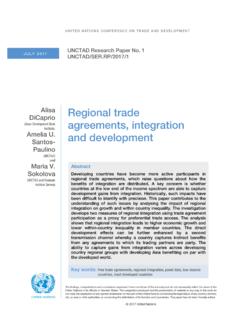Transcription of World Health Organization Collection on Long-Term Care
1 KEY POLICY ISSUES World Health OrganizationCollection on Long-Term CareKEY POLICY ISSUESIN Long-Term CAREW orld Health OrganizationGenevaLONG-TERM CAREThis publication can be found on the WHO web site: World Health Organization , 2003 All rights reserved. Publications of the World Health Organization can be obtainedfrom Marketing and Dissemination, World Health Organization , 20 Avenue Appia,1211 Geneva 27, Switzerland (tel: +41 22 791 2476; fax: +41 22 791 4857;email: Requests for permission to reproduce or translateWHO publications whether for sale or for noncommercial distribution should beaddressed to Publications, at the above address (fax: +41 22 791 4806;email: designations employed and the presentation of the material in this publicationdo not imply the expression of any opinion whatsoever on the part of theWorld Health Organization concerning the legal status of any country, territory, cityor area or of its authorities, or concerning the delimitation of its frontiers orboundaries.))
2 Dotted lines on maps represent approximate border lines for which theremay not yet be full mention of specific companies or of certain manufacurers products does notimply that they are endorsed or recommended by the World Health Organization inpreference to others of a similar nature that are not mentioned. Errors and omissionsexcepted, the names of proprietary products are distinguished by initial capital World Health Organization does not warrant that the information contained inthis publication is complete and correct and shall not be liable for any damagesincurred as a result of its named authors alone are responsible for the views expressed in this Library Cataloguing-in-Publication DataKey policy issues in Long-Term care / edited by Jenny Brodsky, Jack Habib, Miriam J.
3 Hirschfeld( World Health Organization Collection on Long-Term care) care of Health care,Integrated - Organization and administration , Jenny , Jack , Miriam 92 4 156225 0 (NLM classification: WX 162) KEY POLICY ISSUES PrefaceiiiiDemographic and epidemiological transitions will result in dramatic changesin the Health needs of the World s populations. Everywhere, there is asteep increase in the need for Long-Term care (LTC).These trends reflect two interrelated processes. One is the growth in factorsthat increase the prevalence of Long-Term disability in the second is the change in the capacity of the informal support systemto address these needs. Both of these processes enhance the need for publicpolicies to address the consequences of these growing need for LTC policies is generally associated with industrializedcountries.
4 What is less widely acknowledged is that Long-Term care needs areincreasing in the developing World at a rate that far exceeds that experiencedby industrialized countries. Moreover, the developing World is experiencingincreases in LTC needs at levels of income that are far lower than that whichexisted in the industrialized World when these needs , the search for effective LTC policies is one of the most pressingchallenges facing modern society. Recognizing that such trends greatlyincrease the need for well coordinated and cost-effective LTC, theWorld Health Organization (WHO) launched a global initiative, with theJDC-Brookdale Institute leading this goal of the project is to prepare a practical framework for guiding thedevelopment of Long-Term care policies in developing countries.
5 Thisframework will address the major issues and alternatives in designing LTCsystems. The framework is not intended to provide specific prescriptions,but rather a basis for translating national conditions, values, culture, andexisting Health and social policies into a Long-Term care CAREivThis process is based on a number of major premises: Previous efforts have not been successful in identifyingmeaningful policy guidelines that are appropriate to theunique situations of developing and middle-income countries. A key resource in formulating LTC policies for developingcountries is their own existing experience. LTC policies in the developing World need to reflect eachcountry s unique conditions, which have to be understoodin much more depth and complexity.
6 There is much to be learned from the experience of industrialized countries in order to define the range of optionsand to identify successful and unsuccessful policy practices. There is a need to create a deeper and more informed dialoguebetween the experiences of industrialized and developing countriesso that there can be a mutually beneficial learning the course of the project, a number of steps have been taken to promoteexchange of experience. In 1998, a comparative review of the implementationof Long-Term care laws based on legislation and entitlement principles infive industrialized countries (Austria, Germany, Israel, Japan and theNetherlands) was carried out and summarized in a widely distributed report: Long-Term Care Laws in Five Developed Countries (WHO/NMH/ ).
7 In implementing this study, a framework was developed for cross-nationalcomparisons of LTC policies that address the needs of December 1999, a meeting of a group of LTC experts from the industrializedand developing World identified specific issues in LTC provision in developingcountries. Their general recommendations were submitted in a report andaccepted by the 108th WHO Executive Board (WHO Technical Report Series,No. 898), and ratified by the 54th World Health Assembly in May, lesson from this workshop was that to go beyond previous discussionsrequires a more in-depth understanding of the existing situations in developingcountries and the nature of the variance among countries. Thus, a plan wasdeveloped to request in-depth case-studies from experts in middle-incomedeveloping countries, and in April 2001 a second workshop was organizedwith these experts to discuss the framework for the preparation of thesecase-studies.
8 KEY POLICY ISSUESThis framework was designed to emphasize additional elements that wouldbe important in the developing country context, and also to examine the moregeneral Health and social policies and service structure along dimensions thathave major implications for Long-Term care. Case-studies of the general healthsystem and current LTC provision in ten developing countries were written bylocal Health care experts (People s Republic of China, Costa Rica, Indonesia,Lebanon, Lithuania, Mexico, Republic of Korea, Sri Lanka, Thailand, andUkraine).Furthermore, to complete and broaden the picture of patterns of LTC policiesin industrialized countries, case-studies of countries without a legislativeframework (including Australia, Canada, and Norway) were additional perspective was provided on the experience of the industrializedcountries by commissioning a set of papers on key cross-cutting include: The role of the family and informal care, and mechanismsto support the family.
9 Issues of coordination among various LTC services,and of LTC with the Health and social service systems. Human resource strategies in delivering series of video conferences that opened a dialogue between WHOH eadquarters and the six Regional Offices on desirable directions forlong-term care was also next step was to convene the group of leading experts from industrializedand developing countries who had prepared the papers, together with WHOR egional Representatives and key WHO Headquarters integrative papers on the overall patterns identified and lessons learnedfrom the case-studies of industrialized and developing countries wereprepared by the Brookdale team for the meeting, which took place inNovember 2001 in Annecy, purpose of the meeting.
10 Bridging the Limousine Train Bicycle Divide,was to assess what has been learned thus far from the experiences of bothindustrialized and developing countries that can contribute to the developmentof LTC policies for developing CAREThe report from the meeting, entitled Lessons for Long-Term Care Policy(WHO/NMH/ ), gives a broad overview of the nature of the backgroundmaterials that were prepared and the issues that were discussed. It alsopresents some general conclusions that were agreed on by the parallel, work proceeded on developing estimates of current and futureLTC global needs. R. H. Harwood and A. A. Sayer analysed the 1990 WHO Global Burden of Disease data and prepared estimates for allWHO Member States.
















